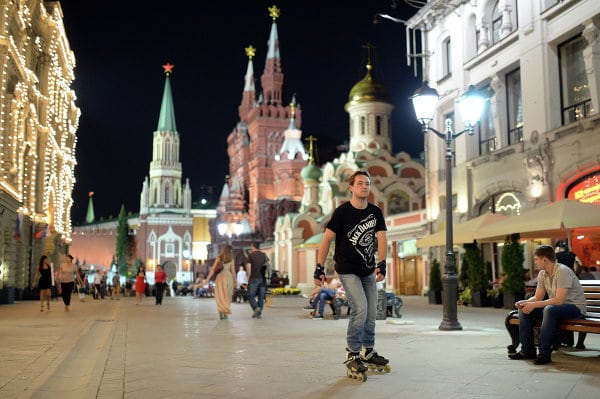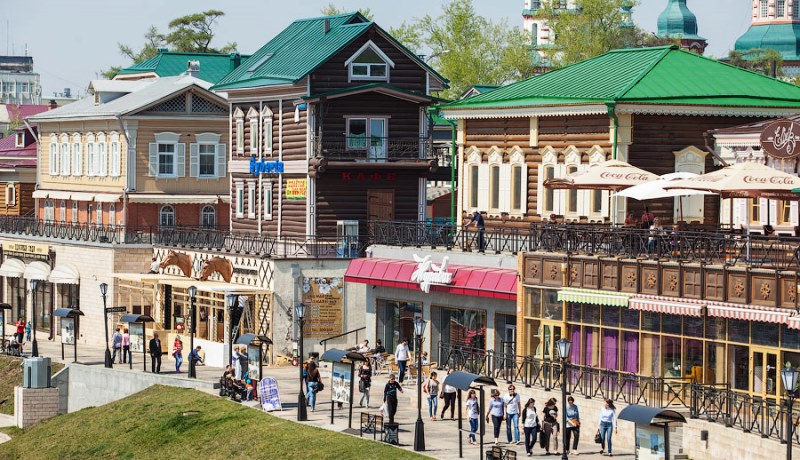Our fifth annual State of Study Abroad in Russia follows a fairly quiet year in Russia. The economic changes that came in 2015 and 2016 have been absorbed and turned into a new normal and slow economic growth. This condition is expected to continue throughout 2018, along with a stable political environment.
The main changes we’ve seen this year are, much like last year, in the international field. With Russia constantly featured in dramatic news stories, many people viewing from afar are understandably skeptical that life in Russia could possibly be normal.
Living Inside Russia’s Economic and Political Environment
After a small contraction in 2016, Russia returned to an estimated 1.7% growth in 2017. The US, for comparison, grew an estimated 2.6%. Russia is expected to grow by 1.7-2.2% in 2018 (the US is forecast for 2.7% growth). Inflation in Russia is at historic lows and falling at 4% (it’s at 2.1% and rising in the US). Unemployment in Russia is just over 5% (4% in the US).
It is true that Russia’s recent growth has not benefited wide margins of its population (much like in the US). It is also true that Russian paychecks are considerably lower than in the US – but it’s also true that the cost of living in Russia is lower as well. Moscow is about 45% cheaper than New York. In Irkutsk, a Russian regional center, prices run about 45% less than those in Memphis or Boise.
I am not arguing that Russia’s economy is equivalent to that of the US. Russia still has considerable structural reform to undertake to ensure further economic growth. Legacy problems remain from the communist era and the disastrous 1990s. However, there are more similarities – and more bright spots – than one might think.
Recent shifts are encouraging. New infrastructure is spreading through major Russian cities. Increased economic diversification and reduced wastefulness mean that Russia’s budget now balances with oil at $56 per barrel, down from over $100 just a few years ago. Lower dependence on oil also means that the ruble, for the first time in its post-Soviet history, is ignoring shifts in oil prices. A more stable ruble will mean more stable consumer prices as imports will feel less influence from exchange rate fluctuations.
Politically, polls indicate that while Russians have an increasing appetite for change, they also still value stability. In upcoming elections, Vladimir Putin will likely retain his post with 65-70% of the vote (according to polls conducted by both the state and the opposition). While small, unsanctioned protests (drawing less than .01% of a city’s population) are becoming more common, they are currently no more dangerous to society than recent waves of protests have been in America. Further, 92% of Russians recently polled on the anniversary of the Great October Revolution of 1917, stated that Russia categorically does not need another revolution. Steady, peaceful change is still favored by the Russian populace.
Most serious Russia watchers are not discussing whether the Putin regime or the fabric of Russian society will face a serious challenge either at the polls or on the streets with the coming elections. Instead, most are closely watching for cabinet position and policy changesor signs that a successor is being groomed for 2024. While this may be “boring” – it is stable.

The View of Russia from the Outside
Ask yourself what you might think about your country if all that you knew of it you found out from TV, newspapers, and social media feeds. These tend to focus on events that are out of the ordinary, that feature violence and crime, or that might strike a strong emotion in viewers. While newsworthy, these events do not necessarily describe what life is like for most people living in the places reported on. But they do tend to shape the opinion of those viewing the media from abroad about what life is like there.
Travel warnings issued by governments also tend to focus on uncommon events where risk is specifically present. We can see this in the warnings issued by the UK, Canada, Ireland, and Germany about travel to the US. These focus on risks of terrorism, violent crime, failing infrastructure, social unrest, and/or natural disasters. These things happen in the US, but do not dominate the daily lives of most citizens. Over the vast majority of America, shops remain open, people go about their lives, and institutions of education and culture continue to operate.
Those of us involved in academic travel to Russia are networked through a listserv called SEELANGs. We met the recent US travel warning against Russia with concern and surprise and so networked together to gain a fuller picture of the risks on the ground. The travel warning lists terrorism and harassment by officials specifically but also references crime and social unrest. None of the many organizations, private researchers, and travelers we heard from had had a recent case of the students or travelers under their guidance being affected by any of these things.
Thus, providers on the ground in Russia plan to continue our academic programs and services there. However, this does not mean that the changing conditions will go unnoticed by students.

What This Means For Students
There is always risk involved in traveling to a foreign country. Each country has different laws which must be followed and there are specific laws governing visas and foreigners within their borders. In addition, most students will travel to very large cities, and much of the culture shock and risk they will face will come not from being in foreign country, but from being in a city much larger than any that they have been in before.
SRAS and other reputable study abroad organizations have long standing policies that recognize and manage these risks. Students are given orientations upon arrival to help them navigate their new surroundings. Students are briefed on visa regulations and health and safety issues before and after arrival. We ensure that students have insurance and access to English-speaking health care or translator-assisted care. We ensure that students have cell phones that can be used in the event of an emergency.
Anti-Americanism is not a concern. Russians are particularly adept at realizing that the actions and policies of a government do not necessarily reflect the will of all of its citizens. Russians approaching Americans are very likely to ask for opinions regarding America, Russia, and recent events. In general, if Americans are willing to discuss issues within the context of expressing their opinion and coming to understand someone else’s, they will find a number of fascinating conversations waiting for them in Russia. Russians, on the whole, are also understanding of someone declining to discuss politics.
The major impact of all of this American students hoping to study abroad is that with the State Department having declared Russia a “level 3 country,” Gilman Scholarships are no longer available for Russia-based study and Boren Award applicants must sign a waiver and complete an additional plan for a back-up country in order to apply. Both Boren and Gilman are supported by the US government. As many universities have policies specifically tied to State Department travel warnings, students depending on university-supported programs to go abroad are also now facing difficulties.
Options are still available, however, outide of Russia. For Russian-language immersion as well as optional anthropology, regional studies, and geopolitics courses, we are recommending students to explore SRAS programs in Bishkek, Kyrgyzstan. SRAS programs in Kiev, Ukraine also provide Russian language as well as optional courses in conflict resolution and identity studies. Warsaw, Poland is another excellent option still open to those interested specifically in studying security issues abroad, while optionally learning Polish and/or continuing with Russian language study.
Lastly, we are seeing that as public opinion on Russia becomes more polarized in the US with Russia’s recent prevalence in the news, that there is increasing interest in study abroad to Russia. This is encouraging as it shows that students are more interested in gaining a fuller, more objective view of a country with increasing geopolitical significance. That knowledge should be increasingly valuable in the near future both to the students themselves and to their future employers in government, business, or academia. Despite the recent changes to government funding, for anyone hoping to go into professions like government, diplomacy, or security or into academic fields like history, literature, or language, spending a least a few months in Russia should be considered mandatory. One can only truly understand that which one has experienced.


